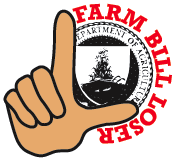As the European Union gears up for the CAP Health Check in 2008, the United States is already deep in debate over the Farm Bill, which is due for renewal this year. Just as the CAP sets Europe’s farm policies, the Farm Bill (each one lasting for 5 years) defines agriculture policy for the US. And just like the CAP, the Farm Bill is hostage to the narrow producer interests that benefit directly from the policy: big, industrial agribusiness and farmers who monoculture the five big subsidized crops: corn, soya beans, wheat, rice and sugar. ‘Outsiders’ such as consumers, taxpayers, conservationists and those speaking up for farmers in poor developing countries rarely get much of a look in. In the mix is the Environmental Working Group, a dynamic bunch who back in 2002 were the first to lift the lid on the secrets of US farm subsidy recipients and who continue to punch well above their weight on Capitol Hill, on issues ranging as wide as toxics in tap water to mining on public lands in the western US. And of course, food and farming policy.
A couple of weeks ago Michael Pollan, a New York Times journalist and professor at UC Berkeley – my own alma mater – held an evening ‘teach in’ on some of the high profile issues surrounding the farm bill: subsidies, nutrition, the future of family farming, organics. Ken Cook, President of the EWG, gave a brilliant presentation and thanks to the miracle of high definition webcasting, you can watch it too. (Ken starts at around the 50 minute mark). Ken demonstrates the inequity and unfairness of federal farm subsidies and also takes on the growing suspicion about ‘industrial organic’ farming by arguing that for most of America, the problem is not ‘big organic’ but ‘no organic’.  A particularly priceless moment is when Ken gets the 700 members of the audience to chant in unison, “I am a farm bill loser” while holding their hands in front of their foreheads, teenager style. Ken is on top form and as ever, his talk is as entertaining as it is informative. Enjoy!
A particularly priceless moment is when Ken gets the 700 members of the audience to chant in unison, “I am a farm bill loser” while holding their hands in front of their foreheads, teenager style. Ken is on top form and as ever, his talk is as entertaining as it is informative. Enjoy!
If you want to follow the debate in the US, there’s no better place to start than Keith Good’s daily roundup of farm policy news, over at FarmPolicy.com. And if you want more Ken Cook (and how could you not?), he maintains a blog at MulchBlog.com.

